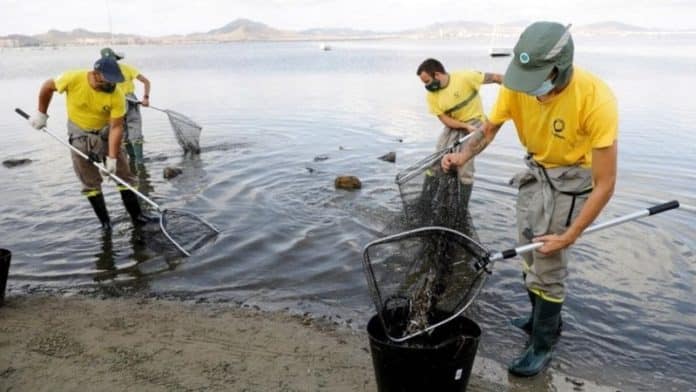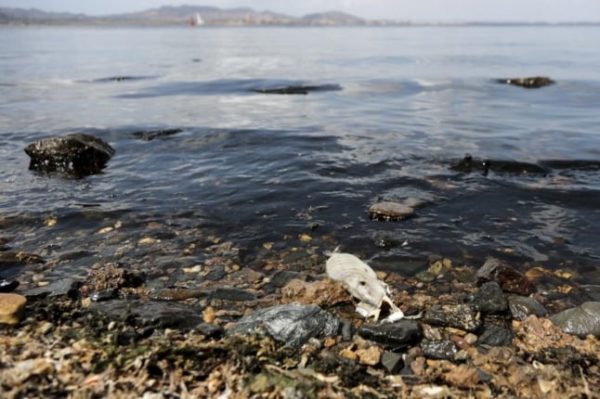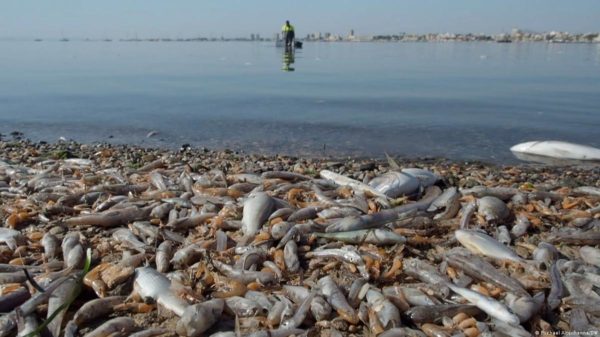Quote: ‘We will not allow coast of Tenerife become the Mar Menor de Canarias’
The Mar Menor dead fish scandal, that lead to thousands of fish floating in the water and on the shoreline, has been likened to a plethora of dead fish washed up onto a Tenerife beach.
“We will not allow the coast of Tenerife to become ‘the Mar Menor de Canarias’ – due to mismanagement by the mayor of Granadilla de Abona, José Domingo Regalado,” said a spokesperson for Salvar La Tejita.
The Salvar La Tejita Association has reported the appearance of thousands of dead fish on the beach of La Tejita in the south of Tenerife.
Following the incident, they have submitted a report to Marine Environment Observers Network, highlighting four different fish species being identified.
200 metres away, the construction of another complex is underway, which Salvar La Tejita has requested information about, claiming they haven’t received any specification regarding the wastewater treatment proposed for this complex.
Neither have they received any proof that the license has been published in the BOE and in a newspaper, both of which are mandatory requirements – before construction of new complexes can take place.
Mar Menor Disaster
In August 2021 tonnes of dead fish washed up on the shores of the Mar Menor saltwater lagoon, shocking local residents and environmentalists.
The government blamed hot weather for the deaths of the fish in the Mar Menor.
Scientists said pollution from local farming had degraded the water quality.
Prosecutors investigated and residents held protests to demand action, with banners on properties, and leaflets distributed throughout the area.
The Spanish central government considered a request to declare the Mar Menor a ‘disaster area’.
The request was sent by the regional government, having come under increasing pressure to save a lagoon plagued by ecological problems for years.
The Mar Menor on the Mediterranean coast is visited by thousands of tourists annually, and more importantly is a sanctuary for marine life.
The condition of the water has deteriorated in recent years, following the degradation of ecosystems and masses of dead fish in 2016 and 2019.
WWF España, an environmental group, said at the time the principal cause of dead fish was the pollution from intensive agriculture in the area, citing the high mortality to a lack of oxygen in the water.
Ecologists said algae can bloom in waters that have been polluted with high levels of chemicals from human activity. This overgrowth of algae blocks sunlight and reduces oxygen in the water, making it difficult for aquatic life to survive.
Ramon Pagan of a local environmental pressure group said: “People call it the green soup. It’s caused by an excess of fertilisers in the water.”
Locals had been demonstrating about the pollution for years, underlined by being unable to set foot in the water or to be on the beach.
The environmental crisis created political tension between the left-wing central government and the conservative regional government, accusing each other of inaction.
The president of Murcia’s government, Fernando López Miras, wrote a letter to Spanish Prime Minister Pedro Sánchez, urging him to convene a meeting to discuss the Mar Menor.
Spain’s minister for the ecological transition, Teresa Ribera, said at the time she would address this issue personally with Mr Miras when she visited the area.
In May 2022 hundreds of dead fish appeared on the shores of Atalayòn area of Santiago de la Ribera, Murcia, with a lack of oxygen one reason cited.
Heavy rain washing nitrogen and phosphorus contaminated water was also mooted.
The polluted water was pointed at farmland.
The Mar Menor Scientific Monitoring Committee and the Spanish Institute of Oceanography warned of the issues escalating.
The Mar Menor is a protected area, separated from the Mediterranean by a 13-mile sandbar, with pollution pointed at poor sewage systems, along with fertilisers and discharge from mining activities.
“We will take all legal measures necessary to protect the coast of the island,” added the Salvar La Tejita Association spokesperson.









